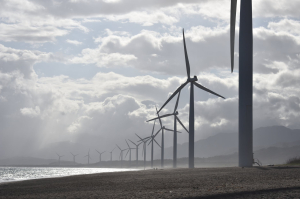The Indonesian government is partnering with the Danish government to advance global Marine Spatial Planning (MSP) in support of renewable energy development, particularly offshore wind power.
Effin Martiana, Secretary at the Directorate General of Marine Spatial Planning, the Ministry of Marine Affairs and Fisheries (KKP), said Indonesia continues to make breakthroughs in ocean zoning by leveraging digital technologies and strengthening the nation’s role in the global MSP initiative. One of the key efforts is the collaboration with Denmark.
“This cooperation relates to marine spatial planning to support the utilization of renewable energy, especially offshore wind,” Effin said during the Knowledge Exchange Program “Marine Spatial Planning Offshore Wind Development and Permitting” held in Copenhagen, Denmark, on Thursday, September 4, 2025 as quoted by Antara.
As the world’s largest archipelagic nation, Indonesia has significant potential for renewable energy development, but also faces challenges in terms of distribution and connectivity. KKP fully supports the use of ocean-based renewable energy as part of accelerating the blue economy agenda through effective ocean zoning.
Indonesia hopes to learn from Denmark’s long-standing expertise in offshore wind, particularly in strategies for large-scale spatial planning and minimizing environmental impacts.
Effin emphasized that job creation in the renewable energy sector marks progress in implementing MSP in Indonesia, aligning with the country’s blue economy priorities. KKP has already issued Marine Spatial Utilization Conformity (KKPRL) documents for offshore wind study plans in West Java and South Sulawesi, providing a regulatory foundation for future projects.
These KKPRL documents also align with regional spatial planning regulations, namely West Java Regional Regulation No. 9/2022 (2022–2042) and South Sulawesi Regional Regulation No. 3/2022 (2022–2041).
“This is concrete proof that MSP in Indonesia is being utilized for economic purposes while protecting ecology,” Effin said.
The knowledge exchange program is part of broader Indonesia–Denmark cooperation to enhance human resource capacity. In addition to KKP, participants included the Coordinating Ministry for Infrastructure and Regional Development, the Ministry of Energy and Mineral Resources (ESDM), state utility PT PLN (Persero), and the Danish Embassy in Jakarta.
Henrik Skovmark, Head of the Danish MSP Secretariat, said the Danish Maritime Authority has built a digital MSP platform to coordinate the multiple uses of Danish waters and support sustainable growth in Denmark’s maritime economy.
“Denmark’s maritime spatial plan is based on the Maritime Spatial Planning Act, which applies a holistic approach to zoning the entire sea area to drive economic growth, marine development, and sustainable use of marine resources,” Skovmark said.
Earlier, Indonesian Minister of Marine Affairs and Fisheries Sakti Wahyu Trenggono stressed that marine spatial planning is key to achieving blue economy goals through the efficient, equitable, and sustainable use of ocean space.
